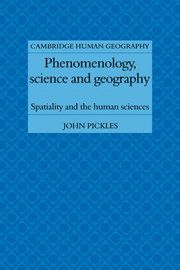Book contents
- Frontmatter
- Contents
- Preface
- Acknowledgements
- 1 Introduction
- PART I GEOGRAPHY AND TRADITIONAL META-PHYSICS
- PART II GEOGRAPHY AND PHENOMENOLOGY
- PART III PHENOMENOLOGY AND THE QUESTION OF HUMAN SCIENCE
- 5 Husserlian phenomenology: the foundational project
- 6 Phenomenology, science and phenomenological geography
- 7 Towards a fundamental ontology of science
- PART IV HUMAN SCIENCE, WORLDHOOD AND SPATIALITY
- Notes
- References
- Index
5 - Husserlian phenomenology: the foundational project
Published online by Cambridge University Press: 07 September 2010
- Frontmatter
- Contents
- Preface
- Acknowledgements
- 1 Introduction
- PART I GEOGRAPHY AND TRADITIONAL META-PHYSICS
- PART II GEOGRAPHY AND PHENOMENOLOGY
- PART III PHENOMENOLOGY AND THE QUESTION OF HUMAN SCIENCE
- 5 Husserlian phenomenology: the foundational project
- 6 Phenomenology, science and phenomenological geography
- 7 Towards a fundamental ontology of science
- PART IV HUMAN SCIENCE, WORLDHOOD AND SPATIALITY
- Notes
- References
- Index
Summary
Philosophers, as things now stand, are all too fond of offering criticism from on high instead of studying and understanding things from within. They often behave toward phenomenology as Berkeley – otherwise a brilliant philosopher and psychologist – behaved two centuries ago toward the then newly established infinitesimal calculus. He thought he could prove, by his logically sharp but superficial criticism, this sort of mathematical analysis to be completely groundless extravagance, a vacuous game played with empty abstractions. It is utterly beyond doubt that phenomenology, new and most fertile, will overcome all resistance and stupidity and will enjoy enormous development, just as the infinitesimal mathematics that was so alien to its contemporaries did, and just as exact physics, in opposition to the brilliantly obscure nature philosophy of the Renaissance, has done since the time of Galileo.
(Husserl, 1917, 17)What is phenomenology?
In juxtaposing ‘geographical phenomenology’ to phenomenology, and in moving from the former to the latter, the claim that the two are not the same is implicit. Thus, we now need to move from what passes for phenomenology in the geographical literature, towards what is actually the case in phenomenology itself. In other words, and with all due respect to those geographers who have gone before us in this area, we need to allow phenomenology to show itself from itself once again.
- Type
- Chapter
- Information
- Phenomenology, Science and GeographySpatiality and the Human Sciences, pp. 89 - 106Publisher: Cambridge University PressPrint publication year: 1985



